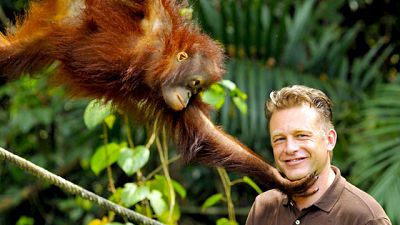Secrets of Our Living Planet
Secrets of Our Living Planet
The Emerald Band (1x1)
:
Chris travels around the emerald band that encircles our planet – the jungles. And he begins by tackling one of the biggest puzzles about the world’s rainforests: why do these places have such a bewildering variety of life, far greater than any other habitat on Earth? His quest begins in Panama where more varieties of birds have been recorded in a single day than anywhere else on the planet.
He reveals that the key to the biodiversity of the rainforests is an almost constant climate. This allows insects and everything else that gorges itself on plants, to flourish all year round. So rainforest plants are under constant attack. The result is an unrelenting arms race, in which only the weird survive. Plants with barbs and poisons for defence; mammals, like the three-toed sloth which has evolved a way to digest leaves that nothing else can digest – even if it means taking days to digest them and moving as slow as, well, as a sloth. And then there are the Heliconius butterflies, that have evolved defence mechanisms against the cyanide of poisonous vines – absorbing the poisons into their bodies to use as a defence against their own predators. Chris reveals how evolutionary arms races in jungles have led to a riotous biodiversity of life.
Chris travels to Borneo to see how some of the largest animals of the jungle, the orang-utan and the forest elephant are crucial in protecting this biodiversity, by spreading the precious seeds of jungle plants, far from their parent plants, to avoid attack by their predators.
He then travels to the Amazon to witness one truly amazing web of relationships centred around the Brazil nut tree. The ecosystem of this tree is too complex for it to be cultivated, so if you’ve ever eaten a Brazil nut, you too, are dependent on its ecosystem. It involves a small rodent, called an agouti, which the tree needs to disperse and plant its nuts, and a rare orchid which attracts a rare male bee, which in turn attracts a female, the o
